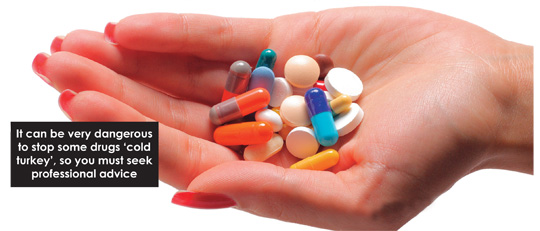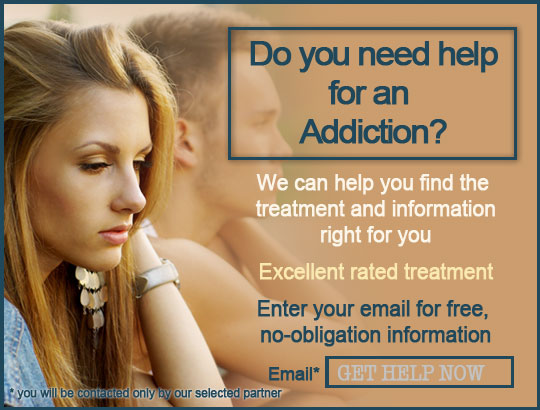Prescription Drug Addiction
You might think that addiction to prescription drugs is largely a thing of the past but it still seems to be a growing problem.
With the arrival of ‘miracle’ drugs several decades ago came the sad realisation that although prescription drugs brought relief to many, they caused untold misery to other users. Tranquillizers were commonly known as ‘mother’s little helpers’ back in the 1970s but were soon to be the nightmare of many housewives and others throughout the modern world.
Facts
Tranquillizers are one of several types of drug which can become addictive. Painkillers, steroids and stimulants, even cough mixtures can be just as habit forming and physically addictive.
According to The Prescription Drug Abuse website (www.prescription-drug- abuse.org) prescription drugs are the second most commonly abused category of drugs behind marijuana, and ahead of cocaine, heroin, methamphetamine and other drugs.
The National Institute of Health estimates that nearly 20 percent of people in the United States have used prescription drugs for non-medical reasons. The same resource gives us the following statement: “The number of teens and young adults (ages 12 to 25) who were new abusers of prescription painkillers grew from 400,000 in the mid-1980s to 2 million in 2000, according to a study by the Substance Abuse and Mental Health Services Administration. New misusers of tranquillizers, which are normally used to treat anxiety or tension, increased nearly 50 percent between 1999 and 2000 alone”. And according to the Western Drug Counseling service, despite blocks many GPs have put in place regarding new users, it is today, in 2011, still rising annually.
Curse or Cure?
The signs/symptoms of prescription medication addiction read as though they were written for an ‘illicit drug’ user. There is little or no difference. Perhaps there is an inherent tendency to feel more sympathy for those addicted to prescription drugs as they were, in most cases, originally prescribed by someone else. The ‘someone else’ is a trusted, professional member of society, someone we go to in times of illness and need, someone we trust and expect to give us good advice and treatment. However, it is up to us to make sure that we do not abuse the usage of these medicines. The temptation to self-medicate can be strong. If a drug helps to make us feel psychologically or physically better, then we might believe a little extra may make us feel even better still. This is not the case and can be very dangerous. Most of these drugs have side effect: many opiate-based, pain-killers, for example, can cause severe respiratory problems, even death.
Dangers of buying drugs online
Another real concern these days is the use of the internet to buy prescription drugs. These are readily available, at a price, but what are you really buying? There is no guarantee that what you think you are buying is what you get. Tests on tablets purchased over the internet have shown some startling results. And it is frightening – really frightening. Many tablets do not contain anything remotely like what one would expect and some contents have been quite harmful. It must also be remembered that many drugs do not mix with others which is why it is important that your doctor knows what you are taking and in what quantity. Many drugs do not mix with alcohol and your GP can advise on this, but only if he knows what you are taking, and again, in what amount.
Getting Help
If you feel that you could be addicted to prescription drugs there is a great deal of help at hand. It can be sorted out with help and knowledge. Only you can decide which method you use to end the habit. What is right for one isn’t necessarily right for another. It may not be necessary to attend a residential clinic in order to stop the dependency.
There is a great deal of help and advice available – it can be as easy as picking up the phone or clicking a link on the internet. The hardest step will be the first one but we urge you to take that step as soon as you feel ready.
Denial is the major barrier to recovery. If you think that prescription drug addiction may be affecting you then deep inside you will know that you need to stop. Allow yourself to bring this to the surface and to face up to what you must do in order to recover.
There are many ways to get clean. Perhaps the best way is to talk to your doctor. Many forms of treatment can be arranged through the NHS or charity organisations so that the financial cost to you is nothing. Of course, there are many private clinics and therapists you can use if you are in a position to do this. Treatment can, to a degree, be tailored to your needs and wishes.
Rehab
Perhaps residential care such as a drug rehabilitation centre is something you would find helpful for you or perhaps a detox at home can be arranged.
Drug reduction
Slow reduction of the number of tablets taken until you take no more can be the answer. In some cases less addictive substitute drugs can be used to help with the symptoms associated with detoxing. It can be very dangerous to stop some drugs ‘cold turkey’ when you have been using them for a long time, so you must seek professional advice.
Everyone’s circumstance is different, there will be psychological as well as physical issues to discuss when deciding on a programme that is right for you. You will also need support during this period and after when there is risk of relapse. All this should be readily available if you look in the right places. Our list of resources should be a good starting point. So if you think you need help, take that first step.
Further Resources:
www.ukna.org – UK Narcotics Anonymous
Talk to Frank: 0800 77 66 00
Parents Against Drug Abuse: 08457 023867
Families Anonymous: 0845 1200 660






